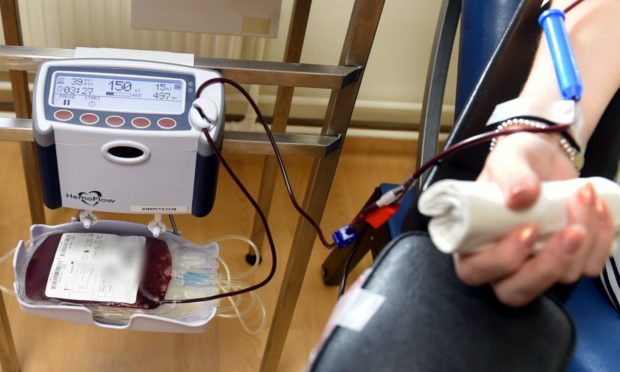More people than ever before can now give blood following major changes to the eligibility requirements for gay and bisexual men.
Coinciding with World Blood Donor Day, potential donors are now being assessed on a person-by-person basis, rather than being subject to “across-the-board” restrictions.
In the past, these had left many men unable to give blood, solely because of their sexual orientation.
Equality campaigners have hailed today as “historic,” as thousands of people previously excluded from the service can now sign up to donate.
What are the changes?
Under the previous system, any man who had sex with another man would have to wait for three months before giving blood.
A similar waiting period was in place for women who’d had sex with a man who had ever had anal or oral sex with another man.
The rule was imposed to cut down on the risk of blood-borne infections, as it is thought around 5% of men who have sex with men (MSM) in Scotland are positive for HIV.
In the heterosexual population, excluding IV drug users, it is around 0.1%.
Before 2011, MSM were permanently excluded from donating blood.
This changed to a 12-month deferral, which was cut to three months in 2017.
The new questions
As of today, a new series of questions will be asked of all donors at their appointment – regardless of their age, sex or sexual orientation.
Each person will be asked if, within the last three months, they have:
- been diagnosed with or treated for (or had sex with someone who had been diagnosed with or was being treated for) a sexually transmitted disease (excluding chlamydia, genital herpes or genital warts)?
- taken Pre or Post Exposure Prophylaxis for HIV (PrEP or PEP)?
- taken part in Chemsex? (Chemsex is defined as sexual activity under the influence of stimulant drugs such as methamphetamine or mephedrone to enhance sexual experiences, often involving sex with several partners during a session).
If the answer to any of those three questions is “yes,” they will be ineligible to give blood for another three months.
They will also be asked if, at any point within the last three months, if they have:
- had sex with someone new, or resumed a previous or infrequent sexual relationship?
- had sex with more than one person?
If they answer yes to either or both of those questions, they will be asked if they have had anal sex with any of these partners.
If so, they will be turned away and asked to return in three months’ time.
Preparing for first donation
The changes have come into effect in Scotland, England and Wales today.
It means many people who were previously excluded can now give blood for the first time.
Scott Bremner, 35, said being repeatedly turned away from donation centres because of his sexuality made him feel “a bit worthless”.
The security worker, from Aberdeen, added: “I’d been in a monogamous relationship for 10 years, but I was penalised because it was with a man.
“We see all the campaigns calling for people to give blood, but then I was told mine was ‘dirty’, essentially.
“It’s great that they’ve wised up and are letting people do it now.”
This also includes Scott Cuthbertson, the development manager for the Equality Network charity, who said: “I’ve been campaigning on the issue of blood donation for gay and bisexual men for over 15 years.
“For me, this was never about a right to give, but the fact that there were many gay and bisexual men that could do so safely.
“I’m pleased the evidence, assessed by experts, has concluded that to be true, and that many thousands of gay and bisexual men will be able to donate their blood and help save lives.
“Today, during Pride Month, I’m proud to donate my blood for the first time alongside many other gay and bisexual men across the UK as the rules which we long felt to be unnecessarily exclusionary have been replaced with a person-by-person risk assessment.”
Blood boss ‘proud’ of changes’
The changes have been implemented following a review by the Fair (For the Assessment of Individualised Risk) steering group last year.
Craig Spalding, director of the Scottish National Blood Transfusion Service (SNBTS), said: “The steering group included representatives from the four UK blood services, LGBT+ groups, medical and scientific experts, and patient and donor representatives.
“Fair concluded that the new donor selection system will maintain the UK’s status as having one of the safest blood supplies in the world.
“The recommendations were designed by epidemiology, sexual health and Infectious disease experts, and were accepted in full by the Scottish and UK governments in December 2020.
“I am proud to implement these changes in SNBTS, and I would like to extend my thanks to all current and future donors in Scotland.”

